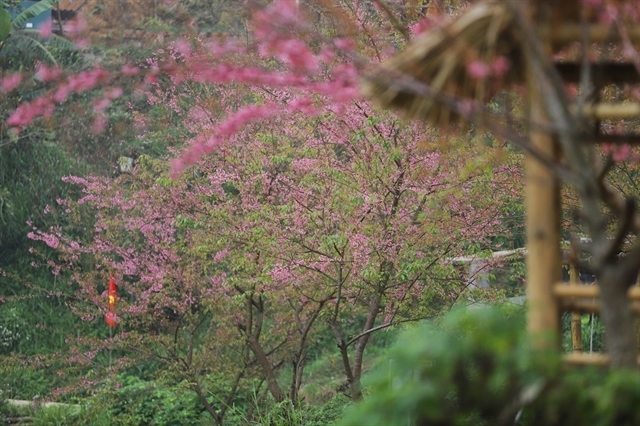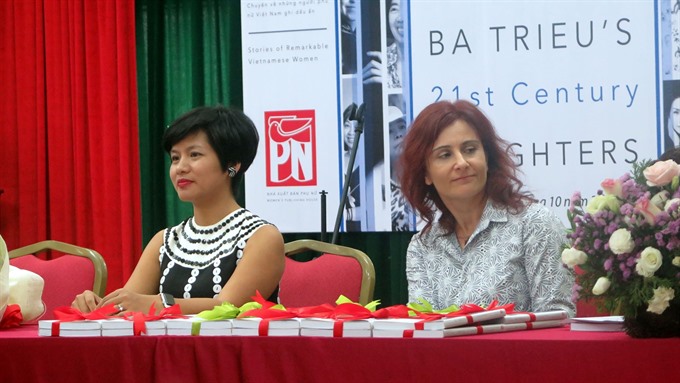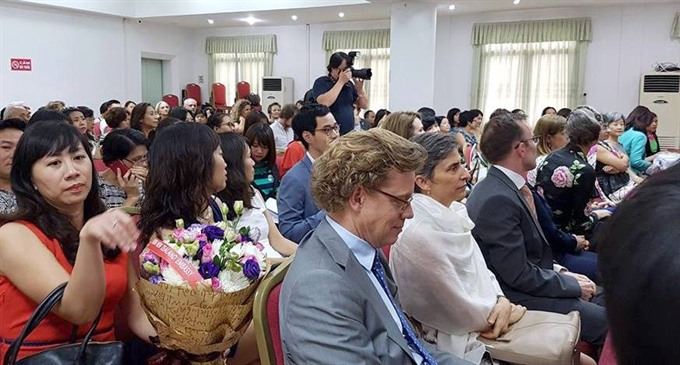 Features
Features

A unique book entitled Bà Triệu’s 21st Century Daughters introduces 20 Vietnamese women leaders of varied ages, backgrounds and professions.
 |
| Authors: Đỗ Thùy Dương (left) and Irene Ohle at the book launching ceremony. VNS Photo Thái Hà |
By Ruti Sinai
Bà Triệu, meaning Lady Triệu, was a 3rd century warrior who raised an army to fight the Chinese occupation of Việt Nam.
“I will not resign myself to the lot of women who bow their heads and become concubines,” the national heroine is said to have declared.
More than 1,700 years later, a woman named Irene Ohler went to a seminar in Hà Nội entitled “The Rise of Vietnamese Women CEOs”. Ohler, a coach who specializes in developing women’s leadership, says she was dumbfounded to hear a male panelist say that “women make good deputy CEOs because they are so caring”.
Her amazement at the male speaker’s absurd remark, especially given that all the women panelists were CEOs, gave birth to a unique book entitled Bà Triệu’s 21st Century Daughters.
The book, officially launched this week in Vietnamese and English, is a first-of-its-kind collaborative effort by Ohler and Đỗ Thùy Dương Hanoi, recently elected to the Hà Nội People’s Committee and herself a prominent businesswoman.
It introduces 20 Vietnamese women leaders of varied ages, backgrounds and professions. Some blazed their trail through more traditional trails, in national or local government as was encouraged by authorities, others were pioneers in the world of business, finance, social entrepreneurship and the arts. All have one thing in common, Ohler writes in explaining the choice of subjects, “their resilience, their industry, their energy and grace in spite of the challenging circumstances many of them face”.
Ohler, originally from Austria and married to New Zealand’s ambassador to Việt Nam, says that as an outsider she was captivated by what seemed an unexplored facet of Vietnamese society and culture, and struck by the fact that the impressive and accomplished women she kept meeting “co-exist with the traditional Vietnamese perception that women and girls are not equal to men and boys”.
Dương’s motivation for the book was a question that had been troubling her for years as she set up her business and travelled the world.
“What enables us to reach the level of women in other ASEAN countries, while our country remains poor and our education system outdated?” says Dương
But while this is a work by women about inspirational women and their strong inner voices, it is not essentially a story of womanhood.
 |
| Wide interest: Hundreds attended the launching ceremony of a book on Vietnamese women in leadership positions. VNS Photo Thái Hà |
“I would claim a feminist perspective, but it comes through in giving these women as much of a voice as possible,” Ohler tells Việt Nam News. “This not a gender book, it’s a leadership book, from which men can learn from women,” adds Dương.
Some female ideologists might find the book frustrating, in that it is not about gender and equality. In fact, although most of the women featured in the book studied in the West, none mentioned gender as an obstacle in their path.
While conceding the existence of a gender gap – like Giàng Thị Lang, an ethnic Mông social entrepreneur who recalls that when growing up “girls had to work harder than boys” - some are tales of equality, almost post-feminist in taking the gender gap for granted.
Thảo Nguyên Griffiths, for example, was appointed at the age of 29 as country director of the Vietnam Veterans of America Foundation. It was the first time the humanitarian organisation had a Vietnamese national at its head, the first who was not a veteran, the first born after the war. To top it all off, she had been born in the north. The fact that she was also a woman in that job was quite secondary and mentioned last in her list of firsts.
Many of those interviewed spoke about innately feminine leadership qualities. Đàm Bích Thủy, president of Fullbight University Vietnam, was especially clear in her message to “never trade femininity for masculinity” in order to be successful.
The personal stories are interwoven with the history of Việt Nam – of the older ones by the war, of the younger by the spirit of “đổi mới” (renewal), a path charted by the government in the 1980s that offered new opportunities and better living standards. Thủy called her war experiences “a gift”.
Dương understands what she means. She was born in 1980 and while her family endured hardship after the wars of the 60s and 70s, “I think the younger generation has a tougher time. They have too many options, too much pressure. They have to be very clear and focused.”
What struck Ohler in looking back on the two-year project was the number of “firsts” represented in the book.
Đàm Bích Thủy of Fullbright was co-founder of the first private consulting firm in Việt Nam; Nguyễn Thị Mai Thanh of the REE Corp was the first to list her newly privatised company on the stock exchange; Hà Thị Thu Thanh, chairwoman of Deloitte Việt Nam, was the country’s first auditor; Pham Kiều Oanh was the first to introduce the concept of social entrepreneurship and Tôn Nữ Thị Ninh, her country’s former ambassador to the EU, was one of first senior diplomats to change the way Việt Nam presented itself to the world after the war.
The women got where they are through widely diverging paths. Diplomat Ninh was educated at the Sorbonne and elected to the National Assembly. So was Nguyễn Thị Hằng Nga, a well-known journalist and editor. But she worked for nine years at a factory in the north years during the war with the US.
The book does not put any of the women on a pedestal, and while all its participants are clearly worthy role models, they are not perfect. It is for exactly that reason that the authors hope it will become a companion for women readers as they seek direction at various points in their lives. VNS